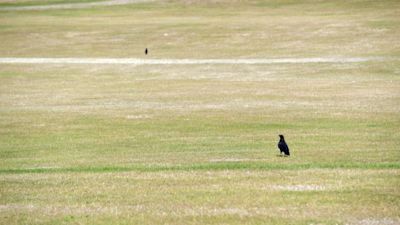Most of Wales moved into drought status amid warning recent rain 'nowhere near enough'

A drought has been declared in most parts of Wales following an extended period of dry weather and "nowhere near enough" rain.
Natural Resources Wales (NRW) confirmed on Thursday that the south-east and most of mid Wales will now join the south-west of the country in drought status.
Officials came to the decision after looking at the latest data on rainfall and water levels.
While essential supplies of water remain safe, the public and businesses in drought affected areas are being urged to use water wisely.
The areas affected in south-east and mid Wales are:
Upper Severn
Wye
Usk
Valleys (Taff, Ebbw, Rhymney, Ely)
Vale of Glamorgan (Thaw)
Despite the move into drought status, there is currently only a hosepipe ban in Pembrokeshire and parts of Carmarthenshire.
The announcement comes less than a week after NRW confirmed drought status in south-west Wales and in response to the pressures high temperatures and the lack of significant rainfall has placed on river levels and reservoirs.
In the first three weeks of August, Wales received around 30.8% of the month's average rainfall.
The country also recently saw its driest five-month period in 40 years, with just 61% of its expected rain between March and July.
While north Wales and the rest of mid Wales remains in prolonged dry weather status, NRW said it continues to monitor areas closely where there are concerns for low river flows.
Natalie Hall, Sustainable Water Manager for NRW, said the recent dry weather had put the environment "under extreme pressure".
She added: "With little in the way of significant rainfall in the forecast, and with the impact the ongoing situation is having on the very ecosystems we all depend on, we have taken the decision to move the south-east of Wales and parts of mid Wales into drought status from today (25 August).
"With south-west Wales already in drought, we’re keeping a close eye on the situation in north Wales and the rest of mid Wales.
"We remain in regular contact with water companies, local authorities and other partners regarding any emerging impacts on the environment, agriculture, and water supplies right across Wales, and will not hesitate to take any further action as needed.”
Ms Hall explained that recent rainfall was far from sufficient to undo the impact of the previous dry weather.
She said: "While we’ve been experiencing some much-needed rain across parts of Wales over recent days, the amounts we have seen are nowhere near enough to alleviate the impacts of many weeks of dry, hot weather.
"We will need a significant period of more prolonged rainfall to see the levels in our rivers and reservoirs replenished to the levels we need.
"As climate change accelerates, summers in the UK are expected to become dryer, and extreme weather events will become more frequent and intense. While essential water replies remain safe, it’s crucial that everyone carefully considers how they use water over this exceptionally dry period."